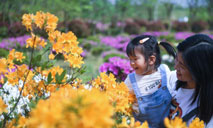India suffering calamitous surge of COVID-19 cases, int'l community extending help
BEIJING, April 28 (Xinhua) -- Over the past week, India has been reporting more than 300,000 new COVID-19 cases each day, while medical oxygen is running out and patients are still waiting for treatment in overloaded hospitals.
The international community has pledged assistance for India, with many countries agreeing to send oxygen, protective equipment and other medical supplies to the new COVID-19 epicenter.
DEADLY VIRUS SURGE
On Tuesday, India's COVID-19 tally rose to 17,636,307 with 323,144 new cases recorded in the past 24 hours. It was the sixth consecutive day that the country had registered over 300,000 cases in a single day.
On Monday, the country reported the world's biggest-ever daily surge with 352,991 new cases.
The World Health Organization (WHO) has said India's deadly second wave stemmed from a "perfect storm" of relaxing of personal protective measures, mass gatherings, low vaccination rates and more contagious variants.
The ongoing wave of infections in the country is estimated to peak in mid-May, according to projections presented at a meeting between Indian Prime Minister Narendra Modi and officials from the worst-affected states.
When reaching the peak time, the daily COVID-19 cases in India are projected to reach 500,000 and may subside between June and July, Indian media reported.
Amid the ongoing resurgence of the pandemic, hospitals across India have undergone a dire shortage of medical oxygen and urged the federal government to help replenish their stocks.
India's federal government on Tuesday said it has imported 20 cryogenic tankers and allocated them to states to address the shortage of oxygen tankers. Additionally, 551 new medical oxygen generation plants would be set up across India, said a statement issued by Modi's office on Sunday.
The country has also converted hotels and railway coaches into critical care facilities to make up for the shortage of beds, but experts said the next crisis will be a lack of healthcare professionals.
"DOUBLE MUTANT" VARIANT
A new coronavirus variant, called "the B.1.617 variant," was first found in India.
The variant, with two mutations, is considered more infectious and transmissible by some medical experts, while WHO spokesperson Tarik Jasarevic said "the extent to which these virus changes are responsible for the rapid increase in cases in the country remains unclear."
According to a BBC report, lab evidence suggested that antibodies may find it harder to block the virus variant, but scientists are still assessing how much immunity is lost.
"I don't think there's any evidence that it's an escape mutation (which could mean) it fundamentally can't be stopped by the vaccines ... I think we have to obviously watch carefully, but there's at present no reason to panic about it," BBC quoted Jeffrey Barrett, director of the COVID-19 Genomics Initiative at Britain's Wellcome Sanger Institute, as saying.
So far, the variant has been detected in nearly 20 countries and regions around the world. Some countries, amid fears of the "double mutant" variant, have imposed restrictions on flights from India.
For instance, on April 19, British Health Secretary Matt Hancock announced that travel from India to Britain is banned for non-British and Irish citizens after India was added to Britain's travel "red list."
On Thursday, Canada announced a 30-day ban on all flights from India.
On Friday, New Zealand categorized India as one of the "very high-risk countries" to "significantly reduce the number of infected people flying to New Zealand," COVID-19 Response Minister Chris Hipkins said.
INTERNATIONAL AID
As India is struggling with the new surge of infections, countries and international organizations have pledged assistance for India in its fight against the pandemic.
Volkan Bozkir, president of the 75th session of the UN General Assembly, on Tuesday called for international aid for India, saying it is time for the world to extend aid and support to India, because no one is safe until everyone is safe, according to his spokesman.
On Monday, WHO chief Tedros Adhanom Ghebreyesus said the situation in India is "beyond heartbreaking," and his organization is sending extra staff and supplies there to help overcome the pandemic.
"China has expressed readiness early on to provide necessary support and assistance to India, and is coordinating Chinese enterprises to positively respond to India's demand for anti-epidemic supplies such as oxygen concentrators," Wang Wenbin, spokesperson for the Chinese Foreign Ministry, told a regular press conference on Monday.
"We are willing to continue to carry out anti-epidemic cooperation with India in various ways in its fight against the epidemic. We are convinced that India will get through difficulties and come out the other side," Wang said.
European Commission President Ursula von der Leyen on Sunday tweeted that the European Union is pooling resources to respond rapidly to India's request for assistance via its civil protection mechanism.
The French Foreign Ministry, in response to needs expressed by Indian officials, said that France will send eight oxygen generators, each capable of providing a hospital with oxygen autonomy for a dozen years, as well as containers of liquid oxygen to supply medical oxygen to up to 10,000 patients a day.
Photos
Related Stories
- Pakistani PM, Bill Gates discuss measures against COVID-19
- Hong Kong reports 7 new COVID-19 cases
- Russian parliament leader says COVID-19 could link to U.S. lab leak
- India's COVID-19 death toll surpasses 200,000-mark
- India reports new highs in daily COVID-19 cases, deaths as death toll surpasses 200,000-mark
Copyright © 2021 People's Daily Online. All Rights Reserved.










